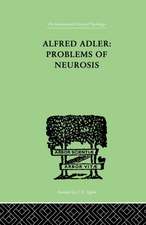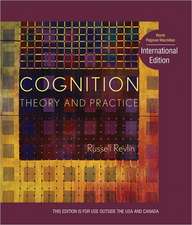Behavioral Development: Concepts of Approach/Withdrawal and Integrative Levels: Research in Developmental and Comparative Psychology
Editat de Kathryn E. Hood, Gary Greenberg, Ethel Tobachen Limba Engleză Paperback – 4 aug 2016
| Toate formatele și edițiile | Preț | Express |
|---|---|---|
| Paperback (1) | 374.31 lei 6-8 săpt. | |
| Taylor & Francis – 4 aug 2016 | 374.31 lei 6-8 săpt. | |
| Hardback (1) | 1358.20 lei 6-8 săpt. | |
| Taylor & Francis – mar 1995 | 1358.20 lei 6-8 săpt. |
Preț: 374.31 lei
Preț vechi: 394.01 lei
-5% Nou
Puncte Express: 561
Preț estimativ în valută:
71.65€ • 77.85$ • 60.22£
71.65€ • 77.85$ • 60.22£
Carte tipărită la comandă
Livrare economică 21 aprilie-05 mai
Preluare comenzi: 021 569.72.76
Specificații
ISBN-13: 9781138964501
ISBN-10: 1138964506
Pagini: 492
Dimensiuni: 138 x 216 mm
Greutate: 0.56 kg
Ediția:1
Editura: Taylor & Francis
Colecția Routledge
Seria Research in Developmental and Comparative Psychology
Locul publicării:Oxford, United Kingdom
ISBN-10: 1138964506
Pagini: 492
Dimensiuni: 138 x 216 mm
Greutate: 0.56 kg
Ediția:1
Editura: Taylor & Francis
Colecția Routledge
Seria Research in Developmental and Comparative Psychology
Locul publicării:Oxford, United Kingdom
Notă biografică
Hood, Kathryn E.; Greenberg, Gary; Tobach, Ethel
Cuprins
Series Editors' Preface, Introduction, I. The Concept of Approach/Withdrawal as Fundamental to the Analysis of Behavioral Development, 1. The Historical Development of the Approach/Withdrawal Concept, 2. Dialectical and Dynamical Systems of Approach and Withdrawal: Is Fighting a Fractal Form?, 3. Approach/Withdrawal Theory and Comparative Psychology, 4. Schneirla's A/W Biphasic Processes Theory, II. Approach/Withdrawal-Biochemical and Neural Processes, 5. Cellular and Network Processes Involved in Biphasic Responses to Noxious Stimulation in Aplysia: Prospects for a Reductionist Analysis, 6. Nerve Growth Factor and Cholinergic Development: Biochemical Levels in Approach/Withdrawal Processes, 7. What and Where Are Memories?, III. Approach/Withdrawal-Socialization, 8. An Analysis of Approach/Withdrawal Processes in the Initiation of Maternal Behavior in the Laboratory Rat, 9. The Mediation of Aggressive Behavior in Mice: A Discussion of Approach/Withdrawal Processes in Social Adaptations, 10. Beyond Attachments: Toward a General Theory of the Development of Relationships in Infancy, IV. Approach/Withdrawal and Individual Differences, 11. The Approach/Withdrawal Concept: Associations with Salient Constructs in Contemporary Theories of Temperament and Personality Development, 12. Approach/Withdrawal Processes in Infancy: The Relationship between Parasympathetic Tone and Infant Temperament, V. The Concept of Levels in Approach/Withdrawal Theory, 13. One View of the Concept of Integrative Levels, 14. The Concept of Levels of Integration, 15. Definitions of Levels of Integration, 16. The Integration of Levels and Human Development: A Developmental Contextual View of the Synthesis of Science and Outreach in the Enhancement of Human Lives, Epilogue, Contributors, Index











